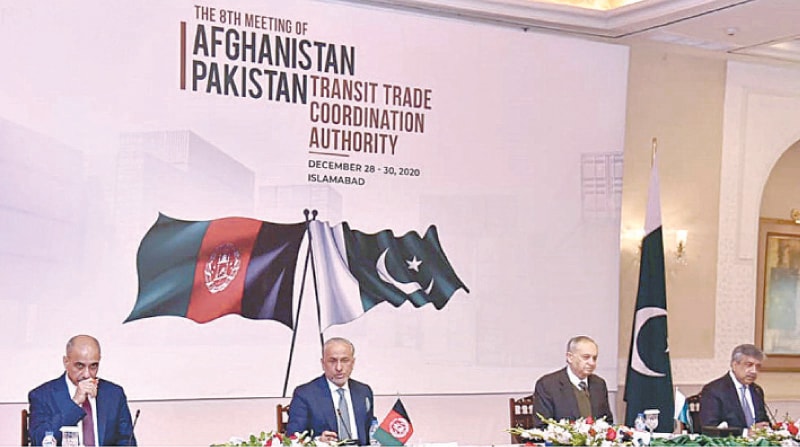
ISLAMABAD: Adviser to the Prime Minister on Commerce and Investment Abdul Razak Dawood has said that a boost in trade between Pakistan and Afghanistan will maximise the chances of regional economic integration and enhance connectivity among neighbouring countries.
“In recent trade dialogue, Pakistan and Afghanistan mainly focused on transit, bilateral and informal trade issues through the agenda of shared prosperity and peace,” Mr Dawood said while addressing the opening session of the 8th round of three-day Afghanistan-Pakistan Transit Trade Agreement (APTTA) with Afghan Minister for Commerce and Industry Nisar Ahmad Faizi Ghoryani on Monday.
He said smooth transit trade for enhancing the connectivity with Central Asian states, connecting regional trade with Gwadar Port and finalisation of APTTA and Preferential Trade Agreement (PTA) with Afghanistan in February 2021 were the main agenda of negotiations between the two countries.
“We have already allowed Afghanistan to use Gwadar for their transit trade as the same was demanded by Central Asian states to connect them with Gwadar Port in near future” the adviser said, adding that Pakistan had agreed to facilitate Afghan trade through Gwadar and Bin Qasim ports as a goodwill gesture to enhance economic ties with Afghanistan.
Afghan minister says Kabul committed to providing all facilities to Islamabad for increasing investment opportunities
He informed the meeting that the PTA between Pakistan and Afghanistan would be finalised by the end of January next year. He expressed the hope that the APTTA review agreement would also be signed in the coming months and investment-related matters would be resolved in bilateral dialogue between Pakistan and Afghanistan. He said that during the three-day dialogue both sides would also discuss access of Indian trade items through mutual borders.
Mr Dawood said that due to coronavirus and other internal issues Pak-Afghan trade was on a halt but now after normalisation of ties, bilateral/transit trade was expected to achieve previous gains. He said both sides would discuss establishment of economic zones to enhance bilateral investment and trade opportunities.
The adviser said Afghan President Ashraf Ghani and Prime Minister Imran Khan encouraged increase of trade and investment relations between the two countries. He said that during previous seven rounds of the dialogue actions were agreed in a comprehensive document called “A Shared Vision” between Afghanistan and Pakistan to support peace and stability in both countries in wider regional interest.
Mr Dawood said both countries had agreed to keep the shared vision, its commitments and previous commitments under a regular review to ensure measurable, clear and irreversible steps towards more productive economic and trade relations between them.
Talking to the media, the PM’s adviser expressed the hope that both countries would resolve all transit and bilateral trade issues. He said trade between Pakistan and Afghanistan had been affected by the Covid-19 pandemic, but hoped that this would be revived soon. He said that now both sides were reviewing use of technology for smooth functioning of trade between Pakistan and Afghanistan.
Mr Dawood said he would lead a delegation next month for talks on the 9th round of APTTA with Afghanistan and all issues would be resolved through the common agenda of peace and prosperity.
Addressing the session, Minister for Commerce and Industry Nisar Ahmad Ghoryani said the Afghan government was committed to providing all facilities to Pakistan for increasing trade and investment opportunities in both countries. He said there was a huge potential of bilateral and transit trade between Pakistan and Afghanistan and both sides were negotiating the common agenda of peace prosperity and regional harmony.
Mr Ghoryani said Afghanistan, through the World Trade Organisation (WTO), wanted to export its goods to the South Asian market via Pakistan for connecting regional economy and trade. He said Afghanistan was ready to connect the regional countries with Central Asian states and that Pakistan and Afghanistan could play a major role through their geographical location.
Published in Dawn, December 29th, 2020













































